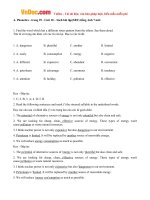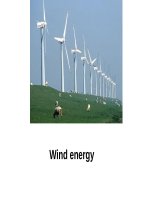Unit 10. Sources of energy
Bạn đang xem bản rút gọn của tài liệu. Xem và tải ngay bản đầy đủ của tài liệu tại đây (1.55 MB, 26 trang )
UNIT 10: SOURCES
OF ENERGY
READING
1
A. Coal
2
B. Nuclear energy
3
C. Garbage
4
D. Biogas
5
E. Natural gas
6
F. Oil
7
G. Wind
8
H. Solar energy
Descriptions of two main kinds of
energy sources
• Renewable energy
sources can be
formed naturally in
a short period of
time. They are not
used up when the
energy is exploited.
• Non-renewable
energy sources
cannot be remade
or regrown in a
short period of
time. They consist
of fossil fuels and
minerals.
Renewable
1. Coal
2. Nuclear energy
3. Garbage
4. Biogas
5. Natural gas
6. Oil
7. Wind
8. Solar energy
Non-renewable
N E W - WO R D
N E W - WO R D
N E W - WO R D
VOCABULARY
• Fundamental /fʌndə'mentl/
(adj, n): serious and very
important, affecting the most
central and important part of
something
Fundamental to sb (sth)
Ex: Hard work is very
fundamental to success.
He taught me the
fundamentals of the job.
• Kerosene /'kerəs
i:n/ (n): an oil
used in the
engine of the
plane and heat
and light
Ex: a kerosene
lamp
• Prospect /'prɒspekt/ (n)
+ of sth/ of doing sth:
the possibility that
something may
happen in the future
Ex: There is no
immediate prospect of
peace.
- Prospective (adj):
potential
• Arduous /'ɑːdj
ʊəs/: involving
a lot of effort
and energy,
being difficult
Ex: The work
was arduous.
Arduously (adv)
• Solar stove /'səʊlə(r) stəʊv/ (n): stove
which consumes the energy from the
sun
• Generate /'ʤenəreɪt/ (v): to produce
or create something
• Ex: They use the energy from the
wind to generate electricity.
Generation (n): the
production of
something
(heat, electricity)
• Respiratory
/respə'reɪtərɪ/ (adj):
connected with
breathing
Ex: Respiratory
disease
Flu is a respiratory
disease.
• Respiration (n)
• Respire (v)
• Respirator (n)
• Expose /ɪk'spəʊz/
sb/sth to sth: to put
sth/ sb in a place or
situation where they
are not protected
from sth harmful or
unpleasant
• Be exposed to sth
• Ex: Babies should
not be exposed to
strong sun light.
• Tendency /'tendənsɪ/ (n) (for sb/sth) to
do sth
Ex: She has a tendency to eat a lot
when she’s stressful.
Tend (v) to do sth= have a tendency to
do sth
• Fundamental
• Kerosene
• Prospect
• Arduous
• Solar stove
• Generate
• Respiratory disease
• Be exposed to
• Tendency
Make sentences with the words
given, at least one red word and one
green word in a sentence.
KER
PR
OS
PE
CT
VILLAGE
RESPIRATORY
EXPOSED
OSE
NE
COOK
F UT UR E
AS
RE
AL
A
M
AT
FAMILY
TENDENCY
RU
R
LE
NT
AL
PR
OB
C
A
TE
R
E
H
ENERGY
GENERAT
E
AR
ST
OV
E
FU
ND
AM
E
O
N
SO
L
N
E
M
N
O
R
I
V
N
E
R
A
U
D
O
U
S
FO
R
T
• Task 1: Choose the best title for
the text:
1. Renewable and non-renewable
sources of energy
2. Solar system and biogas
3. Sources of energy for the poor
4. Advantages of renewable energy
sources
•
1.
2.
3.
4.
5.
6.
7.
8.
Task 2: In which paragraphs are the
following ideas discussed?
C, D
Smoke affects people’s health.
E
Non-renewable sources are being used up.
D
The new source helps farmers do their work
better.
C, D
The new source generates electricity for
poor people.
C
The new source may save people’s lives.
D
The new source is not costly.
E
People may use wind power to serve their
life in the future.
A, B
People don’t have electricity.
1.
2.
3.
4.
Task 3: Answer the questions:
Why are solar systems and biogas
introduced to poor people?
What energy sources does John
Ngujuna’s family use to sustain their
life?
In what way can solar energy improve
the life of poor people in Kenya?
What are the advantages of using
biogas?
1. Why are solar systems and biogas
introduced to poor people?
Because they supply people with
electricity to improve their life.
2. What energy sources does John
Ngujuna’s family use to sustain their
life?
Wood for cooking, kerosene for lighting,
and batteries for the radios and
flashlights.
3. In what way can solar energy
improve the life of poor people in
Kenya?
Saving human energy; solving the
problem of the air pollution;
providing better health care and
education.
4. What are the advantages of using
biogas?
Pollution-free/ smoke-free and cheap.









